 By Pepper Parr
By Pepper Parr
November 11, 2014
Burlington, ON
From the RCAF Awards & Citations Page
BIRCH, F/O John Oswald (J23888) – Distinguished Flying Cross – No.103 Squadron – Award effective 26 September 1944 as per London Gazette of that date and AFRO 2373/44 dated 3 November 1944. Born 1920 in Winnipeg; home in Toronto; enlisted there 21 January 1942. Trained at No.6 ITS (graduated 31 July 1942), No.12 EFTS and No.2 SFTS (graduated 19 February 1943). Commissioned 1943. Award sent by registered mail 19 December 1945.
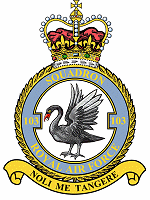 Those are the bare facts – set out as only a military bureaucrat could. The fill story is:
Those are the bare facts – set out as only a military bureaucrat could. The fill story is:
One night in July 1944 John Oswald Birch was pilot and captain of an aircraft detailed to attack Stuttgart. At the commencement of the bombing run the aircraft was hit by anti-aircraft fire. The starboard fin and rudder and a portion of the tail plane and elevator were shot away. The mid-upper and rear turrets were rendered unserviceable. A fuel tank was pierced whilst much damage was sustained to the control surfaces. In spite of this, Flying Officer Birch executed his attack. On the long flight home it was very difficult to maintain control and it was necessary for another member of the crew to assist by maintaining pressure on the rudder controls but an airfield was eventually reached and a safe landing effected. In most difficult circumstances, Flying Officer Birch displayed notable skill, courage and tenacity.
Part of the crew on that Lancaster bomber that night was a man named McDonald. His son Terrence contacted the Gazette asking if a comment written by John Birch might be related to the man who brought that Lancaster bomber back to London where it crash landed.
Terence G. McDonald wrote the Gazette asking:
Dear sir, I was looking up something regarding Bomber Command and I came across your article dated August 27, 2013. One of the people who commented is John Birch. I was stunned because his father and my father were on the same crew.
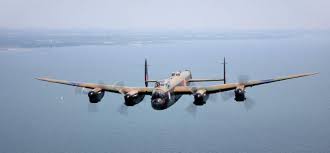 My father was the wireless air gunner and when they hobbled back to England my father, after seeing the majority of crew bail out, in turn bailed out and landed in a tree in Battersea Cemetery. In my father’s memoirs he talks about J.O.
My father was the wireless air gunner and when they hobbled back to England my father, after seeing the majority of crew bail out, in turn bailed out and landed in a tree in Battersea Cemetery. In my father’s memoirs he talks about J.O.
I’ve attached the story as written by my father about that night. If you can track down John Birch and give him a copy I’d appreciate it.
We put the two men together and Terence G. McDonald and John Birch began a long electronic conversation.
Birch wanted to know if Terrence has “any photos or more info re my father, they would be deeply appreciated, as my father’s pilot log book, photo binders, DFC & other service medals, and uniform along with a treasured engraved Ronson lighter with the 103 Squadron logo gifted to him by his crew, and their names engraved on the reverse side, ‘to F/L J O Birch DFC, for getting us home’ were all lost in a house fire in the early 1950’s on Indian Point, Burlington.
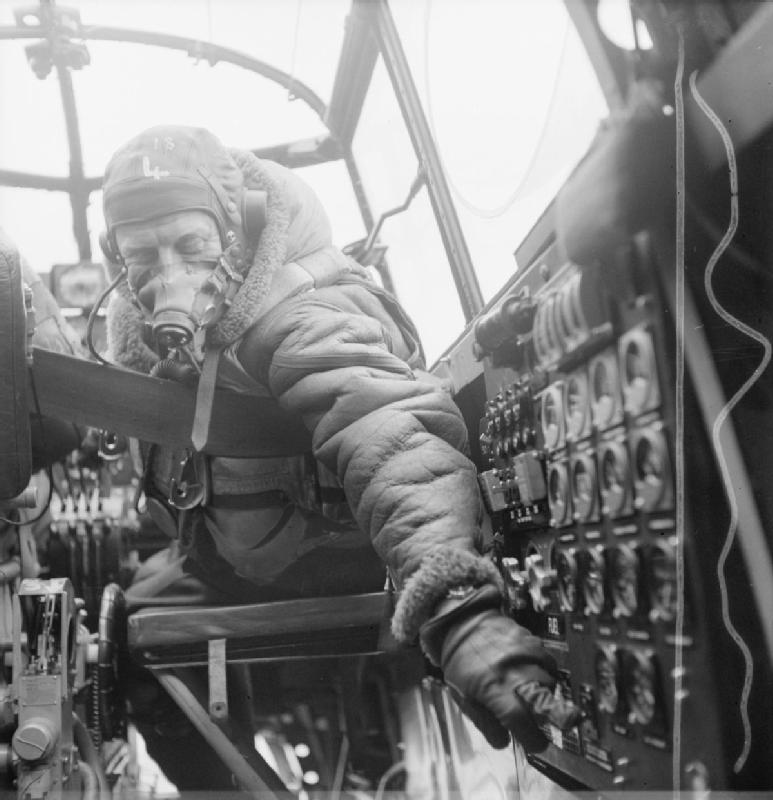
Officers and crew flying in Lancaster bombers were always at great risk and there was no comfort. These were bare bones aircraft built to carry bombs and fight off attacking aircraft with machine guns in turrets.
“My father, so my mother told me, was deeply moved by the gift from his crew.”
Burlington’s John Birch went on to say that: David Fell, archivist for 103 Sq Association Elshom Wolds put me in contact with one of my father’s crew still alive. I received a very personal letter, from F/O A C P Gamble DFC a few years ago, who had replaced F/S Evans as upper turret gunner sometime in August 1944. F/O Gamble was on his second tour and was considered a lucky addition to the crew. He and my father became good friends and everyone referred to my dad as J O.
Mr Gamble stated in the letter, he’d flown with many pilots and considered “good old JO was the best and most skilled pilot I had ever flown with …, I feel I owe my life and surviving the war to your father’s flying skills’
“According to Mr Fell, that night, July 28-29 1944, 103 Sq suffered the worst losses of the war, having contributed 8 aircraft to the 3rd Stuttgart raid, only 4 returned, the rest either shot down or damaged and landing elsewhere. The sister Sq also operating out of Elshom Wolds, contributed 7 Lancs, with only 4 returning.
“Fell wrote that when my dad arrived July 7th 1944 at 103 Sq, moral was quite low, for the preceding 6 months not one aircrew had survived to be rotated out at the end of their tour.
“Casualty rates, as you know, in bomber command was 54% with a statistical likelihood of 5% loss per operation. 5% x minimum 30 operations to complete a tour – well, the math didn’t work out well for the aircrews.
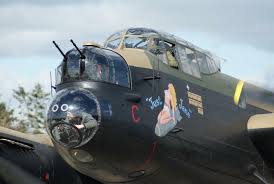
At the nose of a Lancaster there was a bomb aimer and gunners just above them
Birch continues in his correspondence with Terrence to say: “While I knew the entire starboard fin, rudder; controls and horizontal stabilizer were blown off, and the turrets rendered inoperable due to the loss of the hydraulics, and the fuel tank holed, I did not know that 6′ of wing was also blown off along with the bomb bay doors. Lancs could take quite a beating. Quite amazing considering the Lanc’s origin was the disastrous Manchester – but the slide rule boffins at AV Roe added 15 feet of wing to the Manchester and an extra pair of Merlins, called it the Lancaster and a legend was born.
“I do know my father was quite worried when they didn’t report back to base for 3 agonizing days as he thought he might have ordered them to their injury or deaths. My dad’s Lanc made a belly landing at White Waltham SW of London (being the closest field they could make and near out of fuel) and he had directed the non essential crew to bailout once over England, as it was a very tough landing to effect – particularly so now that I know the bomb bay doors were blown off too, leaving a 33 foot long scoop on the bottom of the aircraft. The landing gear could not be lowered.
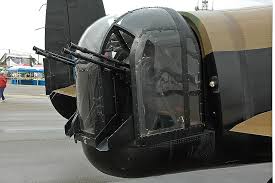
At the tail of the plane were two more machine guns to ward of attackers from the rear.
Birch adds that “it was a good thing for both of us my dad and crew regained control and pulled PB147 out of that dive, for neither of us were yet conceived – and Lancs had such a terrible survival rate in an uncontrolled bailout.
F/O J O Birch DFC was promoted to F/L. He was a Lancaster pilot attached to 103 Squadron RAF. As was common practice RCAF and other Commonwealth crews flew together often as mix and match from across the colonies.
“We owe so much to all of they who served, and really have no idea what it was like.”
That sentiment will fill the air and the hearts of those who gather at the Burlington cenotaph this morning.


















